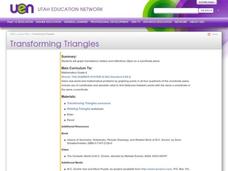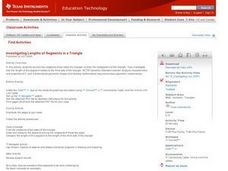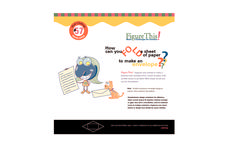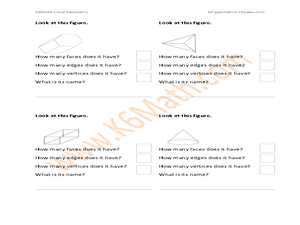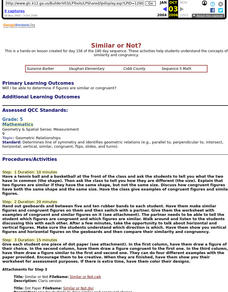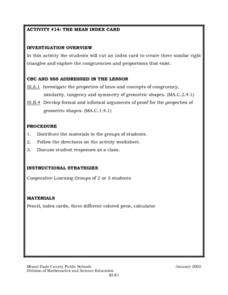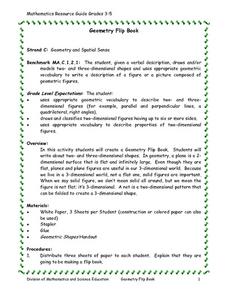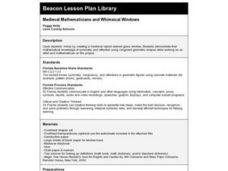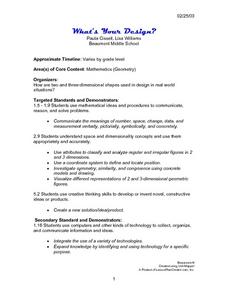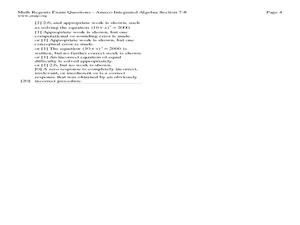Curated OER
Transforming Triangles
Sixth graders graph translations (slides) and reflections (flips) on a coordinate plane. They visualize and identify geometric shapes after applying transformations on a coordinate plane. Finally, 6th graders write a paragraph telling...
Pennsylvania Department of Education
Length and Perimeter
Third graders explore tessellations and the spatial concepts used in creating them. In this tessellations instructional activity, 3rd graders rotate, reflect and transform shapes to create tessellations. Students become...
Curated OER
Investigating Lengths of Segments in a Triangle
Pupils explore the midsegment of a triangle in the geometry instructional activity. They draw and measure the segment joining the midpoints of the two sides of a triangle and compare its length to the length of the third side of the...
Curated OER
Math Challenges
Students participate in a series of challenging math lessons designed to engage their critical thinking skills. In these real-world problem solving lessons, student solve symmetry and repeated pattern problems, make lists/tables to...
Curated OER
Identifying Transformations
In this identifying transformations worksheet, 3rd graders look at three figures and choose reflected, rotated or translated to indicate how it has been transformed.
Curated OER
Determining Faces, Edges and Vertices #3
In this geometry worksheet, students look at a set of figures and determine the amount of faces, vertices and edges of each, then name each figure. A reference web site is given for additional activities.
Curated OER
Area Calculations
In this area worksheet, students calculate the area of figures and determine the length of x. A reference web site is given for additional activities.
Curated OER
Calculating Perimeter
In this perimeter activity, students calculate the perimeter and find given values of 6 figures. A reference web site is given for additional activities.
Curated OER
Angles measure and classify
In this angles worksheet, students measure angles with a protractor and figure out if it is acute, right, obtuse, or straight. Students complete 6 problems.
Curated OER
Similar or Not?
Fifth graders define the meaning of similar and congruent using concrete objects. They make similar and congruent figures using geoboards. They draw their figures on dot paper, and color their designs.
Curated OER
Polygons
Fourth graders identify and describe lines, shapes, and solids using formal geometric language. They use Inspiration to create a graphic organizer and outline of polygons.
Curated OER
THE MEAN INDEX CARD
Middle schoolers cut an index card to create three similar right triangles and explore the congruencies and proportions that exist. They investigate the properties of lines and concepts of congruency, similarity, tangency and symmetry of...
Curated OER
Design Your Own Quilt Pattern
Students apply what they have learned, from Eight Hands Round a Patchwork Alphabet, about how quilt blocks got their names by constructing and naming a quilt block pattern of their own using pattern blocks and pattern block paper.
Curated OER
Geo Jammin' By DeSign - Day 2, Lesson 9: Bringing It To A Fine Gloss-ary
Young scholars create a glossary of geometric terms while exploring tangram manipulatives.
Curated OER
Symmetry of Road Signs
Young scholars identify symmetry in road signs. In this geometry lesson, students explore objects in the real world for symmetry. They perform translation, rotation and reflection.
Teach Engineering
What a Drag!
Stop and drop what is in your hand! Pupils investigate how form effects drag in the 12th part of a 22-part unit on aviation. Groups create equally weighted objects and determine which one falls the fastest by collecting data.
Noyce Foundation
Cubism
If cubism were a religion, would you follow it? Lower-level tasks focus primarily on counting the number cubes in a structure and relating the number to surface area. As learners progress to higher-level tasks, isometric drawings and...
Curated OER
Geometry Flip Book
Students investigate the concepts of geometry that can be grouped into a flip book that can be used for teaching and review purposes. They define the differences between two and three dimensional figures. Also polygons are reviewed and...
Curated OER
Medieval Mathematicians and Whimsical Windows
Third graders demonstrate their mathematical knowledge of symmetry and reflection using congruent geometric shapes while working as an artist and mathematician looking at a medieval-styled stained glass window.
Curated OER
Tiling the Plane
Fifth graders use pattern blocks and triagular grid paper to reivew shape names, be introduced to the concept of a tiling of the plane, and determine which pattern blocks tile the plane. They are asked if they comprehend what a...
Curated OER
What's Your Design?
Sixth grade middle schoolers: design a stained glass window, submitting their initial plan detailing the measurements of all lines and angles. Seventh grade students: create a scale drawing of their own geometric family of four members.
Curated OER
Tessellations
Seventh graders investigate geometric shapes using tessellations. In this geometry lesson, 7th graders practice tessellations using different shapes. They create different designs using tessellations.
Curated OER
Play Dough Day
Twelfth graders build a model of the following figures with the base from column I and the cross-section from column II. Draw the base with labeled axes on the graph paper and construct the figure on top of the base with the play dough...
Curated OER
Twenty Volume Of Solids Problems
In this volume worksheet, students solve twenty volume of various solids problems. The solids examined include: cylinders, cubes, rectangular prism, including how the volumes of these figures change with increased in length. ...


